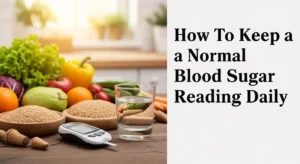Have you ever finished a meal only to feel that familiar crash an hour later? That sudden wave of fatigue, irritability, or even dizziness? If so, you're not alone. Many have experienced this, leading to a journey to understand how we can better manage our blood sugar levels naturally, including the use of natural blood sugar control supplements.
Introduction
The balancing act our bodies perform with blood sugar is nothing short of miraculous. But sometimes, our modern lifestyles throw this delicate system out of whack. While medication has its place, many of us are looking for natural approaches to support healthy blood sugar levels.
That's why I've spent countless hours researching natural blood sugar control supplements that might help those of us trying to maintain healthy glucose levels. Whether you have a family history of diabetes, are carrying a few extra pounds, or just want to feel more energetic throughout the day, understanding these natural options could be a game-changer.
Understanding Blood Sugar and Why Balance Matters
Before diving into supplements to help control blood sugar, let's get the basics straight. Blood sugar, or glucose, is our body's primary energy source. When we eat, especially carbohydrates, our blood sugar rises. In response, our pancreas releases insulin to help cells absorb and use this glucose.
 When this system works perfectly, we maintain steady energy levels. When it doesn't, we experience those dreaded spikes and crashes that can lead to:
When this system works perfectly, we maintain steady energy levels. When it doesn't, we experience those dreaded spikes and crashes that can lead to:
- Mid-afternoon energy slumps
- Intense food cravings (especially for sweets)
- Mood swings and irritability
- Difficulty concentrating
- Long-term health concerns if left unchecked
For those at higher risk—folks over 45, individuals with a family history of diabetes, or those carrying extra weight—maintaining blood sugar balance becomes even more crucial.
Top Natural Supplements for Blood Sugar Control
1. Cinnamon: The Kitchen Staple with Surprising Benefits
Can something as simple as cinnamon really help with blood sugar? I was skeptical too, until I dug into the research.
Cinnamon contains compounds that mimic insulin and increase insulin sensitivity. This means your body becomes more efficient at moving glucose into your cells where it belongs, rather than letting it linger in your bloodstream.
I started adding a half teaspoon to my morning oatmeal, and while it's not a miracle cure, I've noticed more stable energy throughout my mornings. Some studies suggest that consuming just 1-6 grams daily can reduce fasting blood glucose by up to 29%.
How to use it: Sprinkle on oatmeal, add to smoothies, or steep cinnamon sticks in tea. If you're using it regularly, opt for Ceylon cinnamon, which contains less coumarin (a compound that can be harmful in large doses) than the more common Cassia variety.
2. Berberine: Nature's Metformin Alternative
When someone asks, “What is a natural alternative to metformin?” berberine often tops the list. This yellow compound extracted from several plants has been used in traditional Chinese medicine for centuries.
Modern research shows it works through multiple mechanisms to lower blood sugar, including:
- Improving insulin sensitivity
- Decreasing glucose production in the liver
- Slowing carbohydrate breakdown in the gut
- Increasing beneficial gut bacteria
Some studies show berberine's effectiveness is comparable to metformin, a prescription medication for type 2 diabetes, without many of the side effects.
Is it safe to take berberine every day? Generally, yes. However, start with a lower dose to assess tolerance, as some people experience digestive discomfort. Always check with your healthcare provider before starting, especially if you're on medication.
3. Magnesium: The Magnificent Mineral Most of Us Miss
Does magnesium lower blood sugar? The evidence strongly suggests it does. This essential mineral participates in over 300 enzymatic reactions in the body, including those involved in glucose metabolism.
Unfortunately, studies suggest up to 75% of Americans don't get enough magnesium from diet alone. Low magnesium levels correlate with insulin resistance and poorer blood sugar control.
Supplementing with magnesium has been shown to improve insulin sensitivity and help cells better respond to insulin's signal to take in glucose.
Food sources: Dark leafy greens, pumpkin seeds, almonds, black beans, and dark chocolate (yes, really!) are all excellent sources of magnesium.
4. Alpha-Lipoic Acid (ALA): The Universal Antioxidant
Looking for the fastest way to lower blood sugar naturally? Alpha-Lipoic Acid (ALA) may be worth exploring. This powerful antioxidant is unique because it's both fat and water-soluble, allowing it to work throughout the body.
ALA helps lower blood sugar by:
- Increasing insulin sensitivity
- Reducing inflammation
- Protecting against oxidative stress
- Supporting healthy nerve function
How can I get my AIC down quickly? While no supplement works overnight, ALA is among the faster-acting options. Studies show improvements in blood sugar control within 4-8 weeks of consistent use.
5. Chromium: The Trace Mineral with Major Impact
Chromium enhances insulin's action and improves glucose metabolism. It works by helping insulin bind to cell receptors, facilitating glucose uptake into cells.
Though we need only small amounts, many Americans don't get enough chromium from diet alone. Soil depletion and food processing reduce chromium content in many foods.
What is the drink that significantly lowers blood sugar? While no single drink works magic, chromium-rich foods like broccoli can be added to green smoothies for a blood-sugar-friendly beverage.

6. Bitter Melon: Nature's Blood Sugar Manager
What is the one fruit that lowers blood sugar? Bitter melon makes a strong case. This tropical fruit contains compounds that work similarly to insulin, helping move glucose out of the bloodstream and into cells.
Studies show bitter melon may:
- Increase insulin secretion
- Improve glucose tolerance
- Reduce glucose production in the liver
How to use it: Available as a supplement, tea, or the actual fruit (though its strong bitter taste can be challenging for some palates).
Beyond Supplements: Lifestyle Factors That Support Blood Sugar Balance
While lower blood sugar natural supplements can be effective, they work best as part of a comprehensive approach. Here are additional strategies that complement their effects:
Dietary Approaches
What brings down blood sugar immediately? While nothing works instantly, certain foods can help stabilize blood sugar relatively quickly:
- Fiber-rich foods slow glucose absorption
- Protein helps moderate glucose release into the bloodstream
- Healthy fats delay stomach emptying, preventing rapid spikes
What is the number one snack to lower blood sugar? A handful of nuts (particularly almonds) with a small piece of fruit provides a perfect balance of fiber, protein, and healthy fats.
Movement Matters
Exercise is perhaps the most effective natural blood sugar regulator. Even a 15-minute walk after meals can significantly reduce post-meal blood glucose spikes.
How fast can A1C drop in 3 months? With consistent exercise, dietary changes, and appropriate supplements, many people see A1C reductions of 0.5-1% in three months, which is clinically significant.
Hydration and Blood Sugar
Does lemon water flush out sugar? While lemon water doesn't literally flush sugar out, staying well-hydrated helps your kidneys filter blood more efficiently. Adding lemon provides flavor without sugar and may slow carbohydrate absorption slightly.

How to Choose Quality Supplements
Not all supplements are created equal. Here's what to look for:
- Third-party testing: Look for products tested by organizations like USP, NSF, or ConsumerLab
- Appropriate dosage: More isn't always better
- Minimal fillers and additives: Fewer is generally better
- Form matters: Some forms are better absorbed than others (e.g., magnesium glycinate vs. oxide)
- Transparency: Companies should clearly list ingredients and manufacturing practices
Supplements for Specific Needs
For Those Managing Prediabetes
How to reverse prediabetes naturally? A combination approach tends to work best:
- Berberine (500mg 2-3 times daily)
- Alpha-lipoic acid (600mg daily)
- Chromium (200mcg daily)
- Regular physical activity
- Reduced refined carbohydrate intake
For Overnight Blood Sugar Management
What foods stabilize blood sugar overnight? A small protein-fat snack before bed can help, as can certain supplements:
- Magnesium (300-400mg)
- Berberine (if tolerated)
For Rapid Response
How can I bring my blood sugar down ASAP? While supplements aren't immediate solutions, these strategies can help during occasional highs:
- Drink water
- Take a brisk walk
- Consider apple cider vinegar diluted in water (1 Tbsp in 8oz)
FAQs About Natural Blood Sugar Control Supplements
Does apple cider vinegar lower blood sugar?
Yes, research suggests that consuming 1-2 tablespoons of apple cider vinegar before meals can reduce blood sugar responses by 20-30%. It works by slowing stomach emptying and improving insulin sensitivity. Always dilute it with water to protect tooth enamel and esophageal tissue.
What herb lowers blood sugar the most?
Berberine consistently shows the strongest blood-glucose lowering effects among herbs. Gymnema sylvestre and bitter melon follow closely behind. Individual responses vary based on your unique physiology and the specific cause of your blood sugar imbalance.
What vitamins should a diabetic not take?
Those with diabetes should approach certain supplements cautiously:
- Niacin (high doses can raise blood sugar)
- Supplements with added sugars
- High-dose antioxidants may interfere with certain medications
Always consult with your healthcare provider about specific vitamin needs.
What is the most effective supplement to lower blood sugar?
Berberine shows the strongest and most consistent effects in research studies, often compared to the prescription medication metformin. However, the “most effective” supplement varies by individual. Some people respond better to chromium or ALA based on their specific metabolic needs.
How to bring A1C down naturally?
A comprehensive approach typically works best:
- Regular physical activity (especially after meals)
- Consistent meal timing and balanced macronutrients
- Quality sleep (7-9 hours nightly)
- Stress management techniques
- Strategic supplementation (berberine, chromium, ALA, magnesium)
When to See a Healthcare Provider
While supplements can be valuable tools, they're not replacements for medical care. Consult a healthcare provider if:
- Your blood sugar readings are consistently above normal
- You experience symptoms like excessive thirst, frequent urination, unexplained weight loss
- You're currently taking medications for diabetes or other conditions
- You're planning to make significant changes to your management approach
The Bottom Line
Natural blood sugar control supplements can be valuable allies in maintaining healthy glucose levels, especially when combined with mindful eating, regular physical activity, and other lifestyle factors.
Remember that consistency matters more than perfection. Small, sustainable changes often yield better long-term results than dramatic overhauls that prove difficult to maintain.
What's your experience with natural approaches to blood sugar management? Have you found certain supplements particularly helpful? Share your journey in the comments below.








